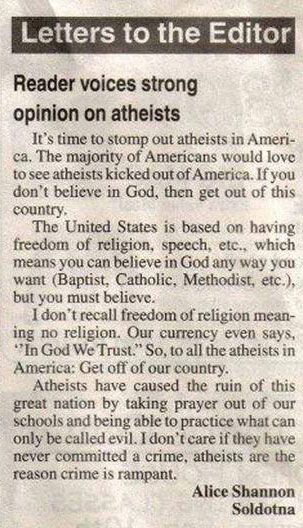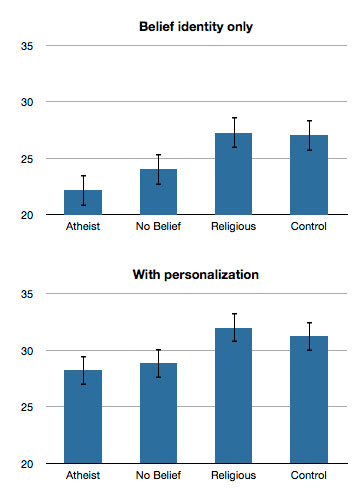A few days ago I wrote a post about religious justification for spousal abuse, linking to Michael Cogdill’s excellent post about his horrific experience as a child in an abusive family.
Cogdill linked to the post from his Facebook page and offered some commentary of his own on the post itself. He was very complimentary about my post, saying “I love this passage from Carolina Atheist for what it says about the failures of hyper-religious fit throwing.” But he also said some things that I disagree strongly with, like “Atheism, I believe, is a way of seeking, of thinking critically into the wilderness [of] questions about mortality.” I don’t think atheism has much to say at all about mortality, except perhaps to point out the failure of theism to offer sound reasoning on mortality.
But Cogdill’s post — and indeed, his entire life — does demonstrate that a person can live in a very ethical and rational manner but still believe in God. People can even be convinced that this belief somehow causes or facilitates ethical and rational behavior, and many of these people really do subsequently behave ethically and rationally. So is right for me to dwell on the one point of difference between myself and Cogdill? Is Cogdill really doing any harm? Shouldn’t I join forces with the likes of Cogdill and set my sights on the people who truly abuse religious power?
To a certain extent, that’s what I am doing. After all, I quoted Cogdill quite sympathetically in my initial post. There are lots of people in the world who are doing wonderful things but happen to have beliefs that I disagree with. For example, former president George Bush (senior) recently shaved his head in support of a 2-year-old with leukemia. That’s awesome! But it doesn’t mean I don’t disagree with him on a whole lot of other issues.
But I also want to make it clear that, just as I don’t think praying for the child with leukemia will make any difference in his prognosis, I don’t think the Christian religions offer very sound advice about when a divorce is acceptable. Cogdill doesn’t really offer much in the way of biblical support for his position that it’s okay to divorce an abusive spouse. Cogdill arrives at his position through reasoning, not faith — and it’s reasoning I agree with.
I think it’s sweet that the folks in the comment thread on my spousal abuse post offer to invoke God on my behalf, but I also think they are misguided. It’s not that I don’t believe they get comfort and support from their religious community; they most certainly do! But I think there are other sources of comfort and support that are much more philosophically consistent and rational.
As the atheist community grows, we need to identify the institutions that will fill the ever-present need for social support and comfort that most Americans turn to religion for. I’m not suggesting that overtly atheist groups would fill this need, although they could be a part of it. The point is not that every institution actively support disbelief, it’s that they don’t support false belief, which is a different proposition entirely. In an ideal world, no one would need to self-identify as an “atheist” because there would be no theists to oppose. Instead, folks might identify by a particular approach to reasoning, like “reductionist” or “relativist.” Support communities might build off of other interests, like cycling or music or politics, and maybe these interest groups would have counseling wings, just like churchgoers today can attend counseling sessions or support groups when they have problems.
In the interim, and especially in the Bible belt, encounters with folks like Cogdill are going to be the rule rather than the exception. For now I prefer to keep face-to-face confrontations on ideology to a minimum. But I’ve carved this pseudonymous online space specifically to confront the areas of difference between atheists and theists, so that’s what I’m going to do here. While I appreciate Cogdill’s words of support, in this space I must also point out where we differ.

